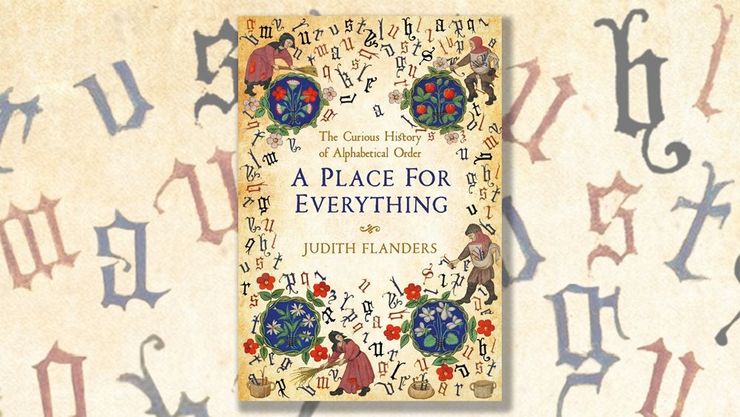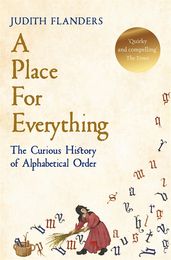The alphabet: The most important thing you never think about
Our lives are organised from A to Z, from who we’re sat next to at school, to where in the library we’ll find our favourite author. But it wasn’t always this way. Judith Flanders tells us more.

The alphabet governs the organisation of our lives in many ways we may not even think about. We make friends at school based on who we sit next to in class, our teenage social lives often at the mercy of where our name falls in the register. But what if students were sorted by wealth and social status instead, as they were at 18th century Harvard and Yale? Judith Flanders’ book A Place For Everything investigates the long, complex history of the alphabet and its rise to prominence. Here Judith tells us how we used to sort things before alphabetical order became ubiquitous, and why these ways might not be as odd as we think.
In Nick Hornby’s joyously morose High Fidelity, Rob the record-shop manager spends a great deal of time organizing his collection of albums in a system that is comprehensible only to him: by date of purchase. My sister, by contrast, shelves her books by the colour of their covers. It’s not enough to know that Karl Marx wrote Capital (yes, that’s the kind of book she owns), you also have to know her copy has, what else, a red spine. Rob sorts by autobiography, my sister by aesthetics.
And, once I began researching for A Place for Everything, I realized that neither of them is particularly weird. In fact, it may even be that I, who – I thought boringly – shelved my books in alphabetical order by author’s last name, might be the weirdo. Because I realized, ultimately, that alphabetical order has always been a sort of afterthought, a way of ordering things neutrally when we can’t come up with anything better.
In the Middle Ages, encyclopedists, almost all of them churchmen, sorted their material theologically: God came first, followed by the angels, then the saints, then mankind, animals and finally inanimate objects. Putting angels – angeli – before God – deus – just because ‘a’ comes before ‘d’ in the alphabet didn’t merely suggest an eccentric method of sorting; it suggested you hadn’t understood the divine order of creation – in effect, it suggested you were a bit stupid. (Although, just to stop us feeling smug in the rationality of the modern world, it should be noted that doctors in the West frequently prescribe a prescription drug for three days, a remnant of the symbolic value of the Holy Trinity, or seven days, a nod to God’s creation of the world in a week, despite clinical trials showing that two or four or eight days work just as well.)
Governments in the Middle Ages had different ideas. Or, rather, they had the same idea, expressed differently: their organizational system was still focused on hierarchy, but on a human one, rather than divine. The Domesday Book, that summary of land occupancy in England and parts of Wales produced for William the Conqueror in 1086, assessed the values of 13,418 places, organizing them first by social status, then by geography, then by status again, and finally by wealth. The king headed the list, then for each region there was a descending order, from the great clergy through the powerful barons, and finally to each district’s most humble tenants.
Wealth and social status were not unusual sorting categories. As late as the end of the eighteenth century, Harvard and Yale Colleges still used hierarchy as their primary sorting filter for their students, with enrolment lists ordered first by the students’ families’ social position and wealth, then subcategorized by whether or not their fathers had attended the college. The students’ own performance powered their rise or fall in the class lists as the year progressed, but at formal events social status remained the sorting tool for the order in which students entered rooms, and for seating arrangements.
Alphabetical order is random – dormice don’t get bigger enclosures in a zoo than elephants do, because ‘d’ comes before ‘e’. And because it is random, it is, unlike hierarchy, or wealth, or status, or even if your parents went to university, entirely democratic. Someone whose last name begins with ‘a’ is not considered to be cleverer, or richer, or better-looking than someone whose last name begins with ‘z’. Nor is Oliver Cromwell considered to be less important than Charles I, whose head he cut off, just becomes Charles comes first in an alphabetical listing. So democratic is alphabetical order, in fact, that the compiler of the first bibliography written in French apologized to his readers for choosing a system where subjects might precede their monarch, children their parents – the world turned upside down by virtue of alphabetical order.
And while all these systems sound bizarre to us, in whom the primacy of the alphabet has been instilled in our everyday lives, we switch effortlessly from system to system. Bookshops use type (fiction/non-fiction), and then subject (history/cookery/travel), or age (adult/teenage/children’s fiction), or date (World War II/Victorian/Tudor history), and only then settle down to alphabetical order.
For, with so many sorting possibilities open to us, with so many ways of organizing the world around us, we have stopped noticing that thing that we do every day, with objects, with paperwork, and with our lives – we sort. How we came to do it, and what our choices have been, is what A Place for Everything is about.
A Place For Everything
by Judith Flanders
Once we’ve learned our A to Z, few of us give the alphabet much thought, but the alphabetical system of organisation plays a major role in or lives. In A Place For Everything, acclaimed historian Judith Flanders delves into the long, complex history of the alphabet’s rise to prominence. The book fascinatingly lays out the gradual triumph of alphabetical order, from its possible earliest days as a sorting tool in the Great Library of Alexandria in the third century BCE, to its current decline in prominence in our digital age of Wikipedia and Google.



